- Home
- Leslie Meier
Mother's Day Murder Page 4
Mother's Day Murder Read online
Page 4
“What about closure?” called a reporter. “Can you get on with your lives now?”
Bob Appleton had aged since last summer, his cheeks had sunken, and he spoke slowly, as if forming words were painful. “Frankly,” he said, “I wish they’d never found those bones. Finding those bones took away hope, and I would rather have died hoping that Corinne was alive.”
Then he turned and put his arm around his wife’s shaking shoulders and led her back inside their white clapboard house with a porch and a steep peaked roof, a house that looked remarkably similar to the Stones’ old farmhouse.
Chapter Four
Lucy was still thinking about Corinne Appleton when she got to work on Wednesday morning. She couldn’t understand why the police hadn’t been able to identify her abductor. These were small towns, after all, where everybody supposedly knew everybody. It seemed incomprehensible that such a monster could go unrecognized for so long. So when Ted asked her to interview Rick Johnson, the hiker who had found Corinne’s remains, she was eager to talk to him. But when she finally got him on the phone, there was less than an hour to go before deadline. It wasn’t that he was particularly elusive. It just happened that there were thirty-one R, Rick, and Richard Johnsons in the phone book.
“Boy, you’re a hard guy to find,” she began, after identifying herself. “Have a lot of reporters been calling?”
“No. You’re the first,” he said. “I’m the last one in the book ’cause my wife’s name is Zephira.”
Lucy smiled, pleased to have a scoop. “Well, I really appreciate your talking to me. Can you tell me how you happened to find the bones?”
“Well, I’m a real nature enthusiast,” he began. “I like to hike and I’m a bit of a bird-watcher and this is the season for May warblers. I was hoping to add a few to my life list. So I wasn’t looking at the ground. I was following this old logging road that I know and looking up in the trees when I tripped on something. I looked down and saw it was a bone. Looked like a rib to me. I figured it was from a deer or maybe even a moose, but then I noticed this little bit of cloth kinda stuck on it, and then I knew it wasn’t from no deer, and when I looked around, I saw there were some more bones. I had my cell phone, o’ course, so I called the state police. It took a while for ’em to find me. They had to kind of triangulate off a fire tower, Bald Mountain, and a dirt road. The road’s still in pretty good shape, and it’s been a dry spring, so it wasn’t too muddy.”
“Did you suspect it was Corinne’s bones? Is that why you called the state police?”
“Nope. I didn’t put two and two together. To tell the truth, I wasn’t sure exactly what town I was in, and I didn’t want to call the wrong department. The lines get kinda blurry out there in the woods, and I was kinda distracted by a black-throated blue. I mean, I was close enough to touch it. Amazing.” He paused. “But the cops, the staties, they said it might be this Corinne who disappeared last summer.”
“How did that make you feel?”
“Well, they were congratulating me and telling me what a hero I was for calling, but I didn’t see it that way. I’ve got daughters myself, and I’d sure hate for them to end up like that. I guess the crime scene guys found more, but all I saw, really, was a couple of bones. They were pretty brown. You might o’ thought they was sticks, but I’ve been in the woods enough to know what bones look like. Mostly though, this time o’ year, you see deer, the weak, old ones that didn’t make it through the winter. It was kind of a shock to see that little bit of cloth with the pink flowers. To tell the truth, I haven’t had a good night’s sleep since. I keep worrying about my girls.”
“I have daughters, too,” said Lucy. “I know what you mean.” She was typing as she spoke and apologized for keeping him waiting. “Just one more question. Where exactly did you find the bones? Was it far in the woods?”
“Nah. As it turned out, it wasn’t far at all, but I didn’t realize it, because I started in from the Gilead side. You know the town of Shiloh?”
“Sure.”
“Well, you know Main Street, and then there’s that side road by the church that runs back to the town highways department? Behind the library?”
“Yup.”
“Well, the pavement ends at the highway department, but the road continues on up into the hills there. They keep it clear ’cause o’ forest fires, you know? It’s no problem getting a car in there.”
Lucy was stunned. “So she was there, all that time, only a mile or two from home?”
“Sad, isn’t it?”
“It’s tragic,” said Lucy. “I wonder why all those search parties didn’t find her sooner?”
Rick’s voice dropped to a whisper. “I wondered that myself, but the cops said she might not have been there when everybody was searching. She might’ve been held captive somewhere, something like that, maybe for months, even.”
Lucy had heard a lot of theories about Corinne’s mysterious disappearance, but this was the worst. “I didn’t think of that. That’s horrible.”
“Yeah,” Rick replied. “That’s why I can’t sleep.”
It didn’t take Lucy long to write up the interview after she’d thanked Rick for his time and hung up, and she shipped it to Ted a minute or two before the old Regulator clock on the wall read twelve o’clock. Her work done, she headed for the IGA to do her grocery shopping, but her mind was on Corinne as she wheeled the cart around the aisles. She simply couldn’t believe—she didn’t want to believe—that the poor girl’s body had been lying there all along, only a short distance from home.
What a bitter pill for Corinne’s parents, she thought, pausing in front of a display of detergent bottles. They were on sale, a two-for-one introductory special, and Lucy debated whether she should risk trying the new brand. It was supposed to be good for the environment, but would it clean Bill’s work clothes? Why was she even wasting time like this, she wondered, unless it was to escape thinking about Corinne? She quickly loaded two of the biodegradable jugs into her cart and rounded the corner, heading for the checkout. She was just beginning to unload the cart onto the conveyer belt when she noticed Bar and Tina meeting at the newspaper rack.
Watching, she couldn’t help thinking it was really a clash of cultures, East meets West, Right meets Left, something like that. As usual, Bar’s short blond hair was stiff with hair spray, and she was wearing a pastel knit suit with a knee-length skirt and pumps. Tina was her exact opposite, with long, flowing hair, naturally streaked with gray. She was wearing loosely cut slacks and a flowing jacket that practically screamed natural fiber, topped with an oversize handcrafted necklace. The one thing they did have in common was the phony smile each woman had pasted on her face as they both reached for the last copy of the Boston Globe. Appropriately enough, Tina had the left side, and Bar the right. Neither one seemed inclined to let go.
“It’s my paper,” said Bar. “I was here first.”
“No, you weren’t. I was first,” said Tina, tossing her long hair over her shoulder. “Besides, I’m a subscriber, but the driver missed me this morning.”
“That’s not my problem,” said Bar, speaking in a low voice and enunciating clearly. “I always buy my copy here. I’m a regular customer, so it’s mine by rights.”
“That’s so typical,” fumed Tina. “You think you can have everything you want, including my table at brunch!”
“Admit it. You took that table just to spite me.”
Tina shook her head. “Can’t you let it go? I had nothing to do with it. Jasper just happened to seat us there.”
“I don’t believe it for a minute.”
“Why? Is he on your payroll or something?” Tina smiled. “If you want to know what I think, I think Jasper seated us there because he wanted to have an attractive, happy family sitting at such a visible table.”
Bar didn’t like that at all. “That is so rude, but I should know better than to expect anything else from you,” she said, keeping her voice low but claiming the high ground. “
There’s no reason to get personal. It’s not nice. And for your information, you and your happy family didn’t look all that happy to me!”
Lucy kept on unloading her cart. She didn’t dare meet the cashier’s eyes, or she knew she’d start laughing.
“I see you bought that new Mother Earth detergent,” said Dot, beginning to scan the groceries.
“I thought I’d give it a try,” said Lucy, who was keeping an eye on the dispute at the newspaper rack.
“We were until you came and spoiled it all,” declared Tina, raising her voice and attempting to yank the Globe out of Bar’s hands. “And not just for us, but for everyone there. Do you think they really wanted to hear you carrying on like that?”
“I was just standing up for what’s right,” said Bar, with an indulgent smile. “I was promised that table. But this is the last time we’ll be patronizing that place. Bart was saying the food isn’t as good as it used to be and the service—”
“Oh, so now Bart is a gourmand?” sneered Tina. “How come I’m always seeing his car outside that joint—what’s it called?—the Rainbow Inn.”
“I think you should apologize immediately,” said Bar, giving the paper a sharp tug. “My husband is a highly respected cardiac surgeon.”
Tina’s face was red, and her eyes were bulging. “He’s a pill-pushing Medicaid cheat with a wandering eye, that’s what he is, and everybody knows it,” she screamed. “Now give me my paper!”
“You’re a bully, and I won’t give in to bullies,” hissed Tina. “Let go of my paper!”
“No, you let go!”
“No, you!”
“I think I better intervene, before they come to blows,” said Dot. She marched over and snatched the paper, ending their tug-of-war. “I know this is the last Globe. Maybe we can toss a coin or something. Meanwhile, let me point out there are plenty of other papers, including the New York Times and Wall Street Journal.”
“I want the Globe,” said Bar.
“And she has to get what she wants,” snarled Tina. “Even if it belongs to someone else.”
“Actually, this Globe belongs to Mr. Marzetti,” said Dot, naming the owner of the store. “But what do you say we split it, for free? There’s six sections. You can each have three.”
“I get City and Region,” they both said simultaneously.
“Now, that’s a problem,” said Dot, folding the paper and tucking it under her arm. “I think you better both take the Herald. No charge.”
“Oh, all right, give her the Globe,” exclaimed Bar, throwing her hands up. “At least the Herald supports our president, and I won’t have to deal with the Globe’s liberal bias just to find out what happened to that poor girl.”
“It’s not biased,” insisted Tina, snatching the paper from Dot. “It’s the Herald that’s biased.”
Bar’s eyes were blazing, and she was about to reply when Lucy interrupted. “I think you should read the Pennysaver,” she said, unable to resist a plug. “Tomorrow’s issue has an exclusive story about the Corinne Appleton case.”
They both tuned in and looked at her. Then they both burst into laughter and went on their separate ways, shaking their heads.
“What’s so funny?” asked Lucy when Dot returned to the register. “We do a good job at the Pennysaver. I’ve got the only interview with the guy who found the bones.”
“I never miss an issue,” said Dot, hitting the TOTAL button. “That’ll be one-oh-three fifty-seven.”
Libby greeted Lucy enthusiastically when she arrived home with the groceries, but despite her Labrador grin and wagging tail, most of her attention was focused on the bags of food. She gave each one a thorough sniffing, especially those containing meat.
“Down, down,” ordered Lucy as she struggled to hoist several heavy bags onto the counter. It was only when she tossed a handful of dog biscuits on the floor that Libby turned her attention away from the bag containing lamb chops, on sale for $5.99 a pound. Now that the family was smaller, Lucy could afford an occasional splurge.
When Lucy finished putting everything away, she made herself a peanut butter and jelly sandwich and took it to the kitchen table, along with a glass of milk. She sat there, staring out the window at the woods beyond the backyard, chewing thoughtfully.
This time of year she liked to walk in the woods, looking for wildflowers. They came in quick succession, beginning with lush green carpets of skunk cabbage in damp places and, tucked away in sheltered nooks, jack-in-the-pulpits. She knew where the trillium bloomed every year, and she often found bloodroot, foamflowers, and dogtooth violets. There were also survivors from long-vanished farms: lilacs and apple trees, patches of lily of the valley and, come summer, day lilies. But now that Corinne’s bones had been found in the woods, she wasn’t quite so keen to go hunting for wildflowers. It was silly. Shiloh was miles away, and there was little chance she would come upon anything more gruesome than a pile of feathers or a tuft of fur remaining from a hawk’s dinner, but she didn’t want to chance it. And, anyway, she sighed, getting up to put her plate and glass in the dishwasher, she’d be thinking of Corinne the whole time, thinking of her sweet, young body left exposed in the woods, where scavengers, like raccoons, coyotes, and crows, even pets, like cats and dogs, could gnaw on her.
Just thinking about the evil person who would do such a thing, who would harm a defenseless young girl, made her angry, and she made good use of her emotions, scrubbing away dirt and grime in the kitchen and bathrooms, and thoroughly vacuuming the family-room carpet. She was just putting her cleaning tools away when Libby’s bark announced the arrival of the school bus.
She opened the door to let Libby out to greet Zoe and was surprised to see that Sara had taken the bus home, too. This was surprising because she knew Sara was planning to stay at school to watch Chad play baseball. She automatically reached to feel Sara’s forehead when she came into the kitchen.
“Don’t you feel good?” she asked. “Are you coming down with something?”
“I’m fine, Mom,” said Sara.
“I thought you were staying for the game.”
“I changed my mind.”
Her tone was defensive, and Lucy cast a questioning look at Zoe, who just shrugged her shoulders.
Mentally, Lucy ran through the possibilities. A bad grade? A scolding from a teacher? A fight with Renee or Sassie? Chad with another girl? “Would you like a snack? I got some nice strawberries….”
“I’m not hungry,” said Sara, heading for the stairs and climbing them slowly, as if it were an effort.
“What’s going on?” Lucy asked Zoe, who had pulled the box of berries out of the fridge and was sitting down at the table with them, dipping them into the sugar bowl before popping them in her mouth.
“I dunno, Mom,” she answered, her mouth full.
“Don’t talk with your mouth full, and let’s put some of that sugar in a little dish so you don’t spoil all the sugar in the sugar bowl.”
“Oh, sorry, Mom.”
“She didn’t say anything?” asked Lucy.
“Nope.”
“Was she alone?”
“No.” Zoe put a berry in her mouth and chewed slowly and thoroughly. Lucy thought she’d scream, waiting for her to swallow. “She was with Chad.”
“Really? How did they seem? Were they fighting?”
“No.” Another berry, another wait. “He kissed her.”
Not exactly what Lucy wanted to hear. “He did? Right there in front of the school?”
“A little kiss. Not gross.”
“Is that what upset her?”
Zoe shrugged, and Lucy headed up the stairs and tapped on Sara’s door. When there was no answer, but she heard muffled sobs, Lucy went in. She found Sara facedown on her bed, with her face buried in her pillow. She sat down on the bed and placed her hand on Sara’s back. “Want to tell me about it?”
“No.”
“I think you should. You’ll feel better.”
“I’ll neve
r feel better. I want to die.”
Alarmed, Lucy grabbed her shoulder and rolled her over so she could see her face. “Don’t say things like that.”
“It’s how I feel,” said Sara, tears streaming down her face.
“No boy is worth this. There’ll be another, and another. Believe me.”
“It’s not Chad.”
“Well, what is it then?”
“It’s Heather and Ashley. They took a cell phone picture of me changing into my gym clothes and sent it to the entire football team!”
Chapter Five
The one bright spot that Lucy could count on in her week was the Thursday morning breakfast with her friends. The weekly get-together with Pam, Rachel, and Sue at Jake’s Donut Shack had been a tradition for years now, adopted when their children got older and the four friends realized they weren’t seeing as much of each other as they used to when they constantly met at school and sports events. The four decided they needed to set a time to get together, not only to stay in touch and gossip, but to offer support and sympathy when life became difficult.
Lucy had the most rigid schedule, but she was free on Thursdays until the eleven o’clock news budget meeting at the Pennysaver. Pam, who was married to Lucy’s boss, Ted Stillings, taught dance at Winchester College, the liberal arts college on the outskirts of town. Rachel Goodman, married to attorney Bob Goodman, worked a couple of hours a day providing home care to the town’s oldest resident, Miss Julia Ward Howe Tilley; and Sue Finch was part owner of a thriving child-care center, Little Prodigies. She filled in as a teacher when needed, but her primary role was administrative: developing curriculum, training teachers, and meeting with parents. They all made the breakfast a priority; it was the first thing they inked in their calendars every week. This week Lucy was really looking forward to sharing her troubles and getting some encouragement from her friends.
The others had already gathered at their usual table in the back corner when Lucy arrived.

 Christmas Card Murder
Christmas Card Murder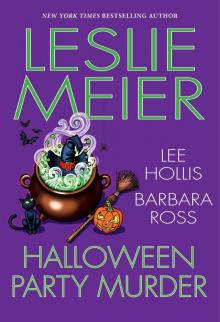 Halloween Party Murder
Halloween Party Murder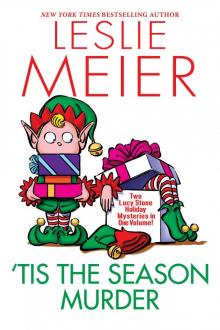 'Tis the Season Murder
'Tis the Season Murder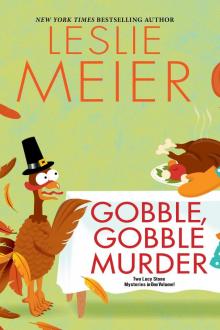 Gobble, Gobble Murder
Gobble, Gobble Murder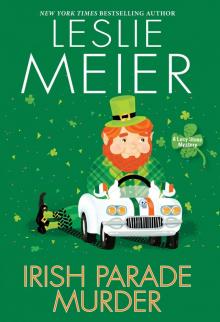 Irish Parade Murder
Irish Parade Murder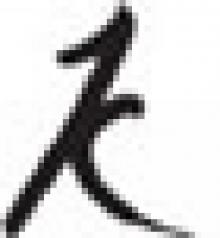 Bake Sale Murder
Bake Sale Murder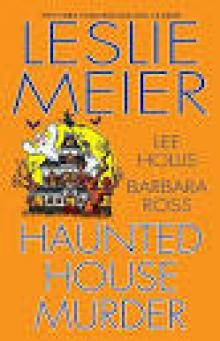 Haunted House Murder
Haunted House Murder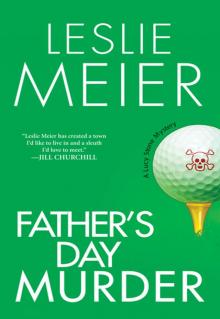 Father’s Day Murder
Father’s Day Murder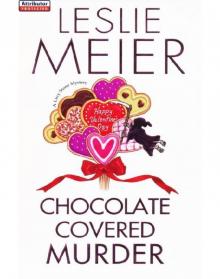 Chocolate Covered Murder
Chocolate Covered Murder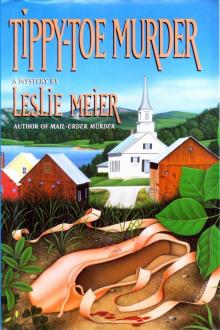 Tippy Toe Murder
Tippy Toe Murder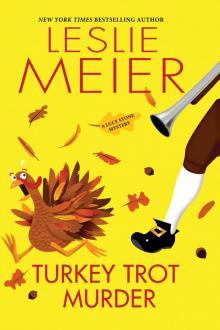 Turkey Trot Murder
Turkey Trot Murder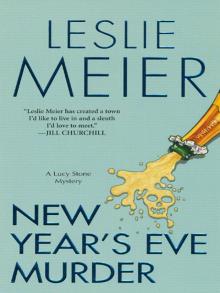 New Year's Eve Murder
New Year's Eve Murder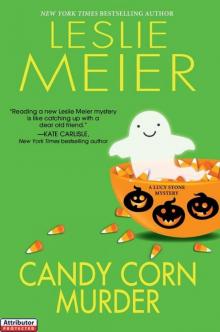 Candy Corn Murder
Candy Corn Murder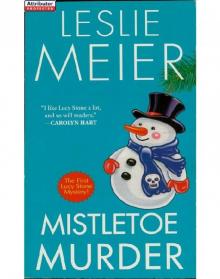 Mistletoe Murder
Mistletoe Murder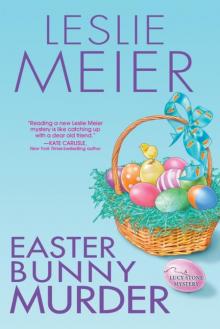 LStone 20 - Easter Bunny Murder
LStone 20 - Easter Bunny Murder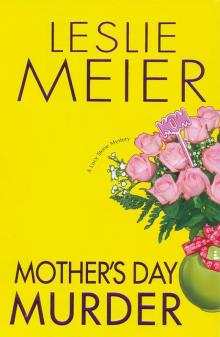 Mother's Day Murder
Mother's Day Murder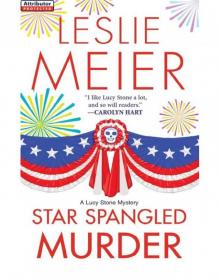 Star Spangled Murder
Star Spangled Murder Silver Anniversary Murder
Silver Anniversary Murder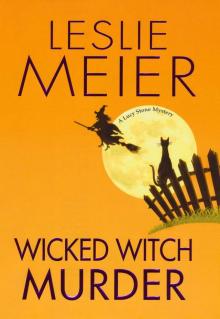 Wicked Witch Murder
Wicked Witch Murder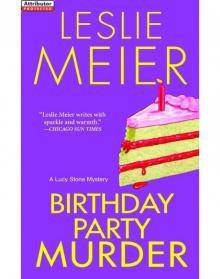 Birthday Party Murder
Birthday Party Murder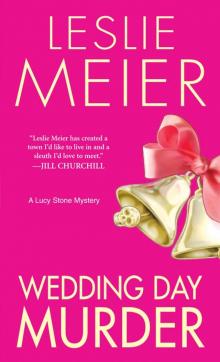 Wedding Day Murder
Wedding Day Murder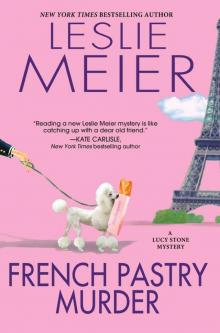 French Pastry Murder
French Pastry Murder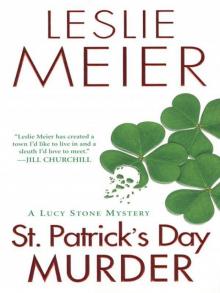 St. Patrick's Day Murder
St. Patrick's Day Murder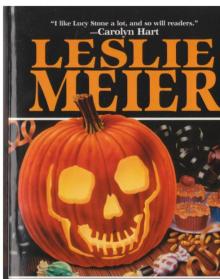 Trick or Treat Murder
Trick or Treat Murder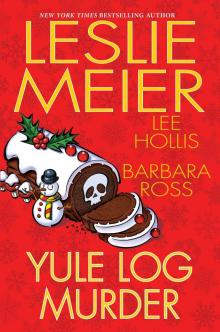 Yule Log Murder
Yule Log Murder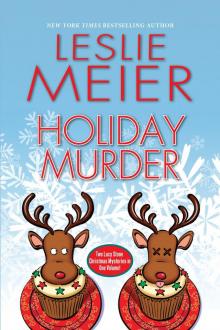 Holiday Murder
Holiday Murder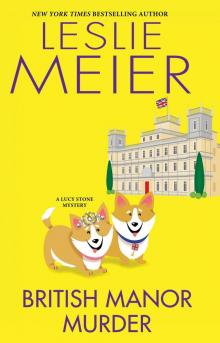 British Manor Murder
British Manor Murder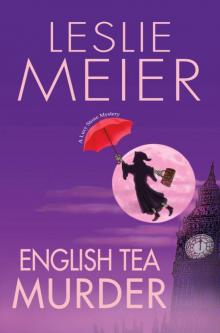 English Tea Murder
English Tea Murder